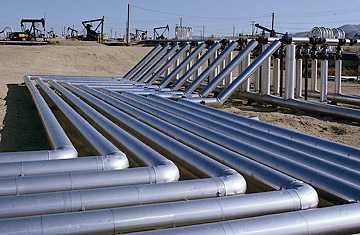
Natural-gas pipelines in California
What's the quickest path to achieving a future in which the U.S. is no longer held hostage by foreign oil and carbon emissions are sharply curtailed? The answer might be natural gas, which some experts predict will become the dominant fuel of the 21st century.
A big advantage for the U.S. is that 98% of the natural gas it consumes comes from North America, including deep pockets of shale gas found in a corridor running from North Dakota to Georgia. That means natural gas should remain available, abundant and cheap for at least the next 100 years. At the same time, carbon emissions from natural gas are about half of competing hydrocarbons such as coal and petroleum.
Yet natural gas accounts for just 24% of the total energy consumption in the U.S., vs. about 23% for coal and 37% for petroleum. Some experts think that needs to change. "Natural gas has the potential to play a much bigger role," says David Pumphrey, deputy director of the Energy and National Security Program at Washington's Center for Strategic and International Studies. He believes gas could reach 35% of America's energy pie in the foreseeable future. However, this kind of change won't happen without the support of new federal and state legislation to give power generators, car companies and industrial users a big reason to rethink their business models.
Take electric power, for example. Electricity from the grid, used to light homes and power the country's IT infrastructure, among other functions, consumes the lion's share of energy — 40% of the total, according to the U.S. Energy Information Administration (EIA). Most of that juice is squeezed from coal and nuclear power, but legislation could alter the mix. "The biggest growth area for natural gas, if a price is put on carbon emissions, is almost certainly electricity generation," says Ernest Moniz, director of the Massachusetts Institute of Technology Energy Initiative in Cambridge, Mass.
Transportation is the other potential growth sector for natural gas. After electric power, it is the second largest consumer of energy in the U.S., at 28% of the total. But there is an especially evil twist here: transportation is responsible for 71% of petroleum consumed, much of it from foreign sources. Natural-gas advocates say now is the time to reduce that vulnerability. "We have a solution staring us in the face," says Sean McAlinden, executive vice president of the Center for Automotive Research in Ann Arbor, Mich. "Since natural-gas fuel costs one-third the price of gasoline but only cuts range by half, it's more efficient."
Natural-gas vehicles (NGVs) are also more efficient than battery-electric vehicles (BEVs). A full tank of natural gas will power a car to go twice as far as a single charge from the battery-powered Nissan Leaf and five times the distance of GM's top-of-line BEV, the Volt.
Yet over the years, Detroit has largely given natural gas the cold shoulder. In the 1990s, Detroit, and in particular Ford Motor Co., actually tried to push NGVs into fleet sales. But at the time, gasoline was cheap, and as a result, corporate and taxi fleets showed little interest in the alternative fuel. Today, Washington, influenced by an environmental lobby opposed to all forms of fossil fuels, is heavily backing advanced battery technology with billions of dollars in funding for R&D and manufacturing. Meanwhile, alternative fuels such as natural gas and advanced diesel are being ignored by policymakers. "This is not only risky, but it actually warps private investment by the automakers, who see leveraged federal dollars available if they will just commit to this single technology," says McAlinden.
Still, natural gas has some serious impediments. Converting a gasoline car to natural gas is expensive, costing anywhere from $6,000 to $12,000. More crucial, there is no refueling infrastructure. (The latter also holds true for BEVs, however, and the cost of building out service stations for either option is expected to be about the same.)
Nevertheless, in the wake of the oil crisis in the Gulf, natural gas could see its base of support grow. "A lot of people love it," says Pumphrey. "Natural gas could still turn out to be a game changer."
